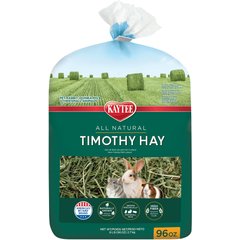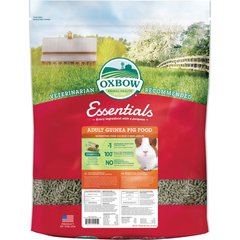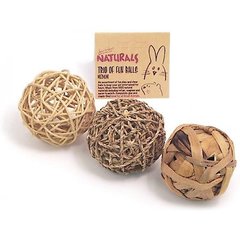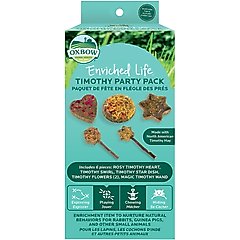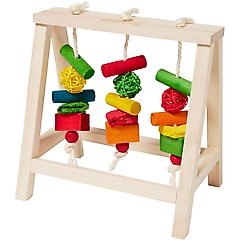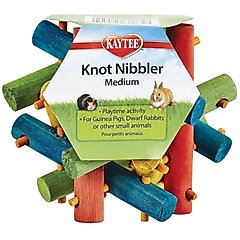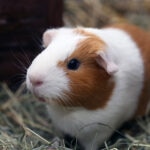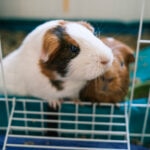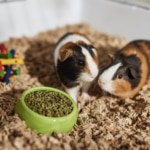What to Know About Caring for Guinea Pig Teeth: Signs of Tooth Trouble and More
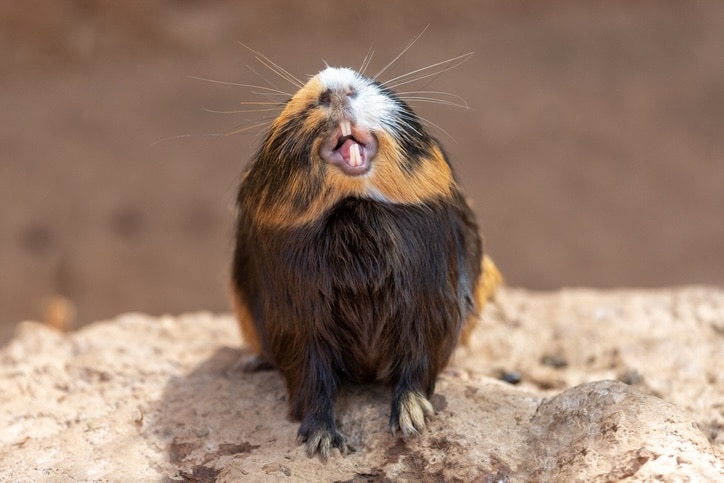
Photo by Vincent Scherer/iStock /Getty Images Plus
In addition to being absolutely adorable, guinea pig teeth can make even the crunchiest baby carrot disappear in an instant.
Plus, these teeth are unique since guinea pigs are natural grazers who need a steady diet of hay to keep their tooth growth under control.
Here’s everything you need to know about guinea pig teeth, dental problems to watch out for, and how to keep your pig’s chompers healthy.
Key Takeaways
- Guinea pig have teeth that grow throughout their life.
- Hay is an essential part of your guinea pig’s diet because it helps wear down the teeth.
- Dental issues in guinea pigs can be serious—take your pig to an exotic vet if you suspect a problem.
What To Know About Guinea Pig Teeth
Guinea pigs have 20 teeth, including four incisors (front teeth), four premolars, and 12 molars.
Their teeth are classified as “aradicular hypsodont,” which is a fancy way of saying they have high crowns and open roots that grow continuously throughout their lives, says Walter Merker, DVM, exotic animal veterinarian at Orange Grove Animal Hospital in Tucson, Arizona.
This, along with the fact that they don’t have canine teeth—the sharper, pointed ones that help you bite into food—makes a guinea pig mouth pretty unique. And since guinea pigs’ incisors can grow around 2 millimeters a week, they need a constant supply of hay to wear down their teeth and keep them growing at a normal, healthy length.
Can Guinea Pig Teeth Have Problems?
Yes, guinea pig teeth can have problems. In fact, dental issues are the most common health problems in cavies, according to the American Veterinary Medical Association.
Common guinea pig tooth issues may include:
- Sharp molar spurs
- Broken teeth
- Loose teeth
- Teeth growing too fast
- Overgrown back teeth that block the ability to eat
- Malocclusion (also known as misalignment)
- Plaque buildup
- Infections
- Abscesses
These issues can occur due to trauma, insufficient or abnormal dental wear, and a lack of timothy hay (the kind of hay that most guinea pigs will need), calcium, vitamin C, or vitamin D. In some cases, dental disease in guinea pigs may be hereditary.
Recommended Products
15 Signs Your Guinea Pig’s Teeth Are in Trouble
As prey animals, guinea pigs will often hide their pain or illness, including symptoms associated with dental issues, until it’s too late.
“There are times when dental issues are obvious in guinea pigs, such as trauma to the large incisor teeth in the front of the mouth, but oftentimes, the signs are more subtle,” Dr. Merker says.
Keep a close eye out for signs such as:
- Reduced appetite
- Dropping food
- Excessive drooling
- Only eating soft foods
- Lethargy
- Wet or unkempt fur
- Dehydration
- Weight loss
- Decreased pooping
- Smaller stools
- Loose tooth
- Visible trauma to tooth
- Discharge from the eyes or nose
- Facial swelling
- Bleeding from the mouth
“Dental disease is a life-threatening disease in guinea pigs,” says Susan Tyson, VMD, veterinarian and owner at Avian & Exotic Philly Vet Medical Surgical Clinic in Philadelphia, Pennsylvania, who notes that cavies are “great pretenders and will pretend like they are eating but are not consuming normal amounts.”
How To Care for Guinea Pig Teeth
There are a few ways to help your pig maintain good dental health, Dr. Merker says:
- Feed them a predominantly hay-based diet (usually timothy hay, but ask your vet) to promote grinding and normal wear of the teeth. Hay should constitute roughly 85% of their daily diet, while pellets should only be 10% and greens 5%.
- Provide toys made from coarse hay or certain types of wood to promote normal wear of the teeth.
- Avoid unsupervised play with children and other pets to prevent injuries.
Recommended Products
Routine vet visits are an essential part of a guinea pig’s care. Opt for an annual wellness visit to have their teeth checked, as well as seeking out vet care when they’re obviously not feeling like themselves. Guinea pigs who are 3 years or older should be evaluated every six months.
How To Check Your Guinea Pig’s Teeth at Home
The best way to safely check your guinea pig’s teeth at home is by evaluating the incisors, Dr. Tyson says. When checking your guinea pig’s teeth:
- Wash your hands and/or wear disposable gloves.
- Have someone hold your guinea pig safely on a table.
- Make your hand into a C shape, placing your thumb underneath their chin and the rest of your hand above the bridge of their nose.
- Using your other hand, gently lift their top lip to check the condition of their top front teeth.
- Lightly pull down on their bottom lip to reveal the bottom front teeth.
Healthy guinea pig teeth are white, wear evenly, and show no signs of injury or malocclusion.
Your vet will check their back teeth with a mouth speculum during their annual or biannual exam.
FAQs About Guinea Pig Teeth
Q: How many teeth do guinea pigs have?
A: Guinea pigs have 20 teeth.
Q: Do guinea pigs have back teeth?
A: Yes, guinea pigs have 12 back teeth known as molars—six in the upper jaw and six in the lower jaw.
Q: Do guinea pigs’ teeth grow continuously?
A: Yes, guinea pigs’ back teeth and front teeth grow throughout their lives, which is why they need a constant supply of timothy hay to wear them down. Hay- or wood-based toys can also help.
Q: What do I do if my guinea pig’s teeth are too long?
A: If your guinea pig’s teeth are too long, bring them to their vet as soon as possible. Your vet may perform an incisor trim or schedule a sedated molar trim.
Q: What should guinea pig teeth look like?
A: The visible crown of a guinea pig’s teeth should be white, and the pre-molars and molars along the lower jaw should be angled slightly inward, while the teeth on the upper jaw are angled slightly outward, Dr. Merker explains. Your vet can teach you more about what looks normal for your pig.
Q: What’s up with guinea pig teeth chattering?
A: Usually guinea pig teeth chattering has nothing to do with dental health. In fact, it’s a sign your pig might be angry or stressed out. If this behavior continues, contact your vet as soon as possible.
Attributions
This content was medically reviewed by Teresa Manucy, DVM, Chewy veterinarian.

